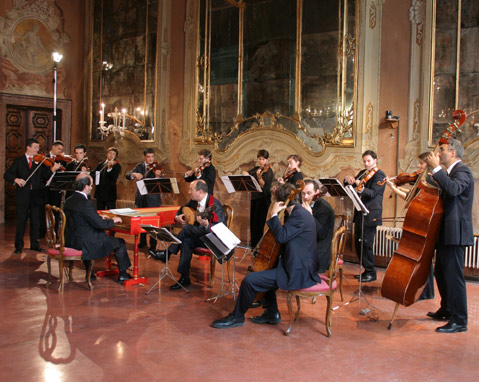The Venice Baroque Orchestra’s Embarrassment of Riches
Arts & Lectures Brings World-Class Early Music to UCSB

Imagine a world with another nine symphonies by Beethoven, all of them just as good. And now stop imagining things, because in the rapidly expanding universe of early and baroque music, this is exactly what is happening. Ensembles such as the Venice Baroque Orchestra (VBO), which will perform at UCSB’s Campbell Hall this Thursday, are combining brilliant performance practice with astounding archival discoveries. Founded in 1997, the Venice Baroque has attracted many of the field’s most interesting and prestigious soloists, primarily by combining rigorous group preparation with leader Andrea Marcon’s extraordinary scholarship. In perhaps his most famous musical coup, VBO founder Marcon located 15 concertos by Vivaldi that had never been recorded before. Last week, I had the pleasure of corresponding by email with violist and founding VBO member Alessandra Di Vincenzo.
How has the group’s focus on the baroque repertoire brought in musical collaborators? The baroque repertoire has allowed VBO to know very good soloists, such as countertenor Philippe Jaroussky, violinist Giuliano Carmignola, mezzo-soprano Magdalena Kožená, and cellist Gautier Capuçon, just to name a few. Usually projects take shape after years of exchanges of opinion between our conductor, Andrea Marcon, and a soloist he meets. Each different meeting is a particular story during which they find a common subject and common ideas, and they always develop exciting projects.
What are some of the revelations that came about through scholarship and archival research? Rediscovering unknown pages is in VBO’s and Andrea’s DNA, and archival research brought us some pleasant surprises. We began our activity with a recording of unpublished concertos and cantatas by Alessandro Marcello, [that were] kept at the Biblioteca Marciana in Venice. Some years later, we recorded 15 violin concertos by Vivaldi that no one recorded before. Thanks to the work of some musicologists and Andrea, we played as world premieres the operas “L’Orione” by Francesco Cavalli; “L’Olimpiade” by [Domenico] Cimarosa; the oratorio “Il trionfo della poesia e della musica” and the serenata “La morte d’Adone” by Benedetto Marcello; and the serenata “Andromeda liberata” by many different composers, [including] Vivaldi. Recently we had the pleasure of bringing good music to light on the occasion of the recording of the unknown [Nicola] Porpora’s arias, thanks to the research work of Philippe Jaroussky.
How is that knowledge reflected in performance? The study of a manuscript always adds something new to a performance. It makes the interpreter aware of the composer’s thought. Even in the case of a modern edition [that has] already been done, the study of the original sources is fundamental. In many cases, you can find apparently insignificant differences, but for an interpreter they are not at all insignificant.
In what way does VBO reflect its city of origin? Maybe through our attention to the lightness of sound. We would like not to charge music with useless weight, especially playing Venetian music, which for us is fluid like water — the environment on which Venice is based.
4•1•1
The Venice Baroque Orchestra appears in concert at UCSB’s Campbell Hall on Thursday, February 6, at 8 p.m. For tickets and information, call (805) 893-3535 or visit artsandlectures.sa.ucsb.edu.



